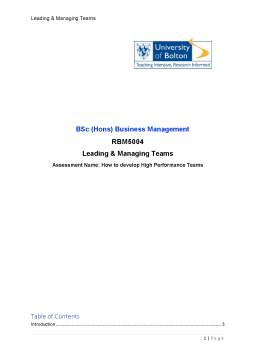Cuprins
- Introduction 3
- What is a team? 4
- Team Development 5
- Team Roles 6
- Motivation 9
- Performance Management 12
- Conclusions 14
- Reference 16
Extras din referat
Introduction
In the literature, one of the most discussed topics is the management of teamwork. More and more managers are convinced that teamwork is the path to success and performance.
This report tried to touch all the aspects that highlight the effectiveness of a team within an organization, such as cooperation, communication, understanding, information sharing between team members, leadership, confronting differences of opinion.
Availability on teamwork is a requirement in current job ads and the presence of the necessary qualities or their lack can be decisive factors in hiring a person or in keeping it in an organization. The need for teamwork became increasingly obvious as human resource policies evolved and companies began to consider the need for communication and human contact of their employees, realizing the superior motivational value of dialogue and mutual support in a team, so this report will explain how factors like motivation and performance management can help to improve organisational performance.
What is a team?
No matter where, the basis of social life is how individuals combine imagination and collective effort to achieve common goals. Over time, it has been shown that any major change has been the result of collective group effort of people who, endowed with talent, skills and motivation, have managed to lay the foundations of projects that are impossible to accomplish individually. In this sense, we can take as an example the Apollo 11 mission (Nasa, 2019), a mission that marked the history of mankind through the collective work of a crew.
“A team is a small number of people with complementary skills who are committed to a common purpose, performance goals, and approach for which they hold themselves mutually accountable.” (Katzenbach and Smith, 1993 cited in Sheard and Kakabadse, 2004, p.13). At the base of each team reside knowledge, skills, respect, loyalty, and trust.
Bibliografie
Armstrong, M. (2006). Performance Management: Key Strategies and Practical Guidelines. 3rd Ed. London: Kogan Page.
Burke, R. and Barron, S. (2014) Project Management Leadership: Building Creative Teams. 2nd Ed. Chichester: John wiley & Sons Ltd.
Franz, T.M. (2012). Group Dynamics and Team Interventions: Understanding and Improving Team Performance. Chicester: John Wiley & Sons Ltd.
Gagne, M. and Deci, E.L. (2005). Self-determination theory and work motivation. Journal of Organizational Behavior, [Online] 26(4), pp. 331-362. Available from: https://onlinelibrary-wiley-com.ezproxy.bolton.ac.uk/doi/abs/10.1002/job.322. [Accessed 3 March 2021].
James, W. (2002). Team Development for High-tech Project Managers. Norwood: Artech House.
Juneja, P. (n.d.) Team Development - Meaning, Stages and Forming an Effective Team. [Online] Available from: https://www.managementstudyguide.com/team-development.htm. [Accessed 18 February 2021].
Kormanski, C. (2002). Building teams and creating community partnership. Counseling and Human Development, [Online] 35(1), pp.1-10. Available from: https://search-proquest-com.ezproxy.bolton.ac.uk/docview/206849463/fulltext/18149FC2A3664D9FPQ/1?accountid=9653. [Accessed 25 February 2021].
Manning, T., Parker, R. and Pgson, G. (2006). A revised model of team roles and some research findings. Industrial and Commercial Training, [Online] 38(6), pp.287-296. Available from: https://www.emerald.com/insight/content/doi/10.1108/00197850610685590/full/html#idm46364478849072. [Accessed 27 February 2021].
Mullins, L.J. (2013) Management and Organisational Behaviour. 10th Ed. Harlow: Pearson Education UK.
Nasa. (2019) What Was the Apollo Program? [Online]. Available from: https://www.nasa.gov/audience/forstudents/5-8/features/nasa-knows/what-was-apollo-program-58.html. [Accessed 3 February 2021].
Neely, A. (2007). Business Performance Measurement: Unifying Theory and Integrating Practice. 2nd Ed. Cambridge: Cambridge University Press.
Sheard, A.G. and Kakabadse, A.P. (2004) The Journal of Management Development. A process perspective on leadership and team development. Bingley: Emerald Publishing Limited.
Youness Eaidgah, T., Kurczewski, A.A.M. and Amir, A. (2016), Visual management, performance management and continuos improvement. International Journal of Lean Six Sigma. [Online] 7(2), pp.187-210. Available from: https://www-proquest-com.ezproxy.bolton.ac.uk/docview/1828152720/fulltextPDF/F9592B0077794A4BPQ/1?accountid=9653. [Accessed 3 March 2021].
Preview document
Conținut arhivă zip
- How to develop High Performance Teams.docx





















